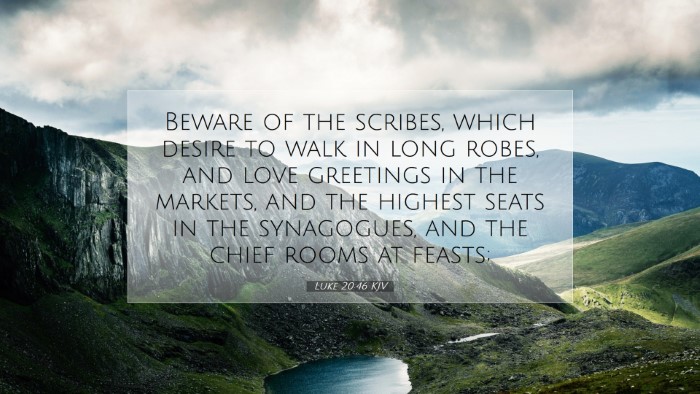Commentary on Luke 20:46
Luke 20:46 states: "Beware of the scribes, which desire to walk in long robes, and love greetings in the markets, and the highest seats in the synagogues, and the chief rooms at feasts."
Overview
This verse serves as a solemn warning from Jesus regarding the religious leaders of His time, particularly the scribes. Through this commentary, insights from esteemed public domain commentators like Matthew Henry, Albert Barnes, and Adam Clarke will be synthesized to provide depth and understanding for pastors, students, theologians, and Bible scholars.
Historical Context
The scribes were scholars and interpreters of the Hebrew Scriptures. They held a significant role in teaching and preserving the Law. However, by the time of Jesus, many scribes had deviated from their original mission, becoming more concerned with outward appearances and societal status rather than true spirituality.
- Matthew Henry: Highlights that the scribes' practices were hypocritical, emphasizing the importance of inner righteousness over external show.
- Albert Barnes: Notes that the scribes sought the admiration and esteem of people, a manifestation of their pride and self-importance.
- Adam Clarke: Observes that their ostentatious attire and desire for recognition indicated their moral decay and the corruption within the religious system.
Warnings Against Scribes
Jesus unequivocally warns against the behaviors exhibited by the scribes. This warning serves multiple purposes:
- Recognition of False Piety: The scribes loved the accolades of men rather than the approval of God. Henry emphasizes the need for introspection and discerning true godliness.
- Caution Against Worldly Affection: The desire for public recognition is a temptation that can lead believers astray, a point echoed by Barnes, who invites readers to focus on humility and sincerity in service to God.
- Confrontation with Hypocrisy: Clarke's observations that their actions were starkly opposed to the teachings of Jesus prompt believers to reflect on their motives in worship and ministry.
The Long Robes
Jesus mentions the long robes the scribes wore, which were indicative of their status and authority within the community:
- Symbol of Separation: These garments served not only as a badge of honor but also as a visible distinction that separated them from the common people.
- Emphasis on Image: Barnes notes that the long robes, while representing their religious authority, ultimately became a crutch for their ego rather than a tool for ministry.
- Contrast to True Servanthood: Henry contrasts their desire for outward recognition with the humility that Jesus advocated for His followers.
Love of Greetings
The scribes cherished the respect and greetings they received in public places:
- Personal Recognition: Clarke highlights this yearning for acceptance as an aversion to genuine humility, wherein the scribes sought validation through public admiration.
- Impact on Ministry: This inclination towards public acclaim not only distorts personal motives but can adversely affect congregational dynamics, as noted by Barnes.
- Privilege Over Service: Henry points out that their love for such greetings distracted them from the essence of their calling as servants of the Law.
Highest Seats and Chief Rooms
The mention of 'highest seats in the synagogues' and 'chief rooms' at feasts speaks to their desire for prominence:
- Desire for Position: The scribes sought places of honor to reinforce their egos and show their status, which is critiqued by all three commentators.
- Contrast with Jesus' Teaching: Clarke draws a parallel between this behavior and Jesus’ call to servant leadership, stressing the value of humility in God's kingdom.
- Caution for the Believer: This desire for positions of authority should serve as a caution to contemporary believers in ministry, urging them to prioritize service over recognition, as emphasized by Henry.
Conclusion
Luke 20:46 intricately illustrates the superficiality ingrained within the religious leadership of that time. Through the synthesis of insights from noted scholars, it becomes evident that Jesus' warning extends beyond mere admonition to the scribes; it encourages all believers to maintain a posture of humility, authenticity, and genuine service.
As pastors, students, theologians, and scholars engage with this text, it beckons a reflective approach towards one's relationship with God and the community. The call to live a life characterized by sincere devotion and to reject the trappings of pride and hypocrisy resonates profoundly, reminding each believer of their true identity in Christ and the call to serve others with grace.


